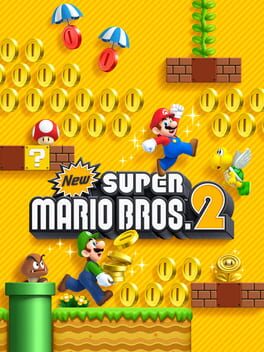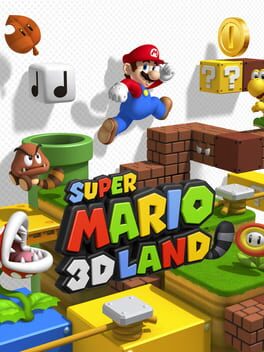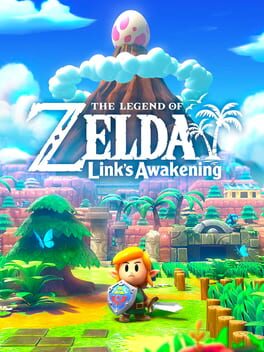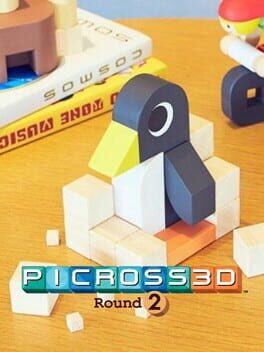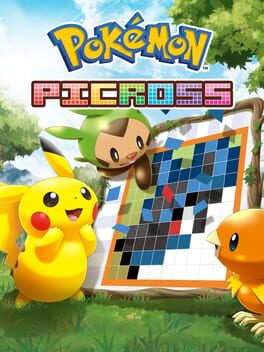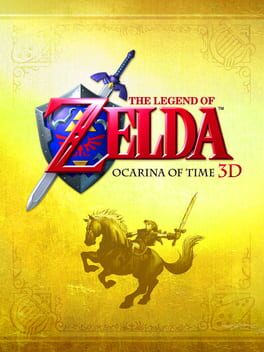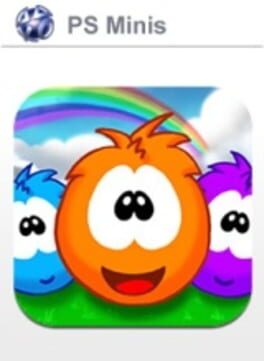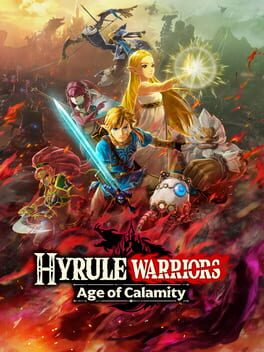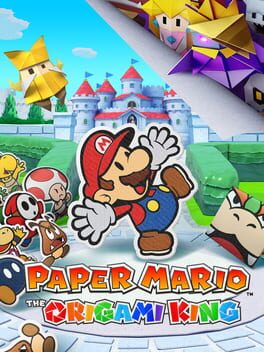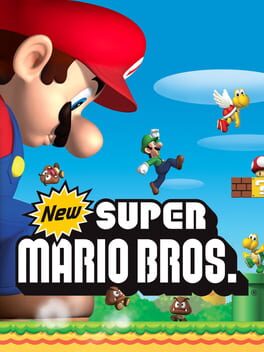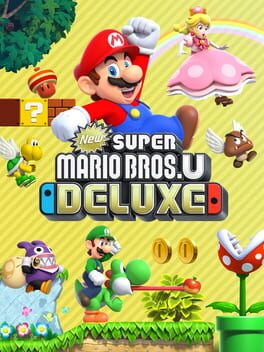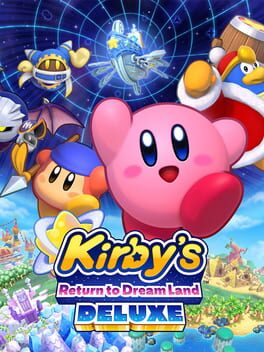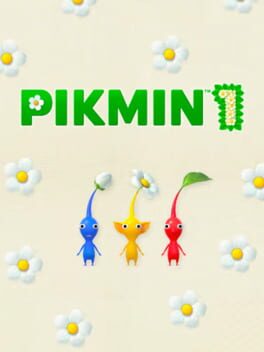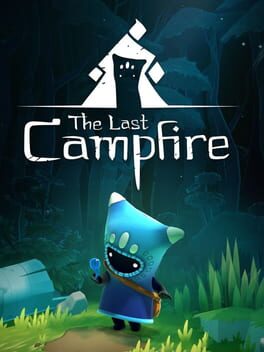SilverMade
This game is pretty much another New Super Mario Bros Game and delivers on that expectation. Because there are so many similiar entries in the series, it has a hard time standing out among them, but the coin gimmick at the very least incentivizes you to approach playing it differently.
Getting a lot of coins also means you're never really going to run out of lives which I enjoyed.
Most people don't seem to look back on this game fondly, but it introduces some nice new level elements that make this game worth playing if you're looking for the video game equivalent to comfort food.
Getting a lot of coins also means you're never really going to run out of lives which I enjoyed.
Most people don't seem to look back on this game fondly, but it introduces some nice new level elements that make this game worth playing if you're looking for the video game equivalent to comfort food.
2011
Super Mario 3D Land is the perfect game for short, bite-sized platforming fun. It plays almost more like a traditional 2D Mario game, but the levels have a structure and obstacles that just couldn't work in 2D.
A lot of the game seems to be designed around the 3D effect of the console, considering the camera's perspective is almost always in just the right spot, enemies love to jump out at you and there's little areas with optical illusions that are difficult to navigate without the effect. It also makes platforming a bit more accurate because it's easier to tell where Mario is and where he's going to land.
While the levels may be short, there are 8 additional special worlds on top of the 8 main worlds where you'll find more challenging levels and remixes of levels you've already played. In the end I felt like I'd seen the same bosses and levels one too many times, but moments like the final Bowser fight more than made up for it.
Not the most memorable of Mario experiences, but one that definitely should be talked about more and will be fun for almost anyone.
A lot of the game seems to be designed around the 3D effect of the console, considering the camera's perspective is almost always in just the right spot, enemies love to jump out at you and there's little areas with optical illusions that are difficult to navigate without the effect. It also makes platforming a bit more accurate because it's easier to tell where Mario is and where he's going to land.
While the levels may be short, there are 8 additional special worlds on top of the 8 main worlds where you'll find more challenging levels and remixes of levels you've already played. In the end I felt like I'd seen the same bosses and levels one too many times, but moments like the final Bowser fight more than made up for it.
Not the most memorable of Mario experiences, but one that definitely should be talked about more and will be fun for almost anyone.
I love everything about this game: The artstyle is adorable, the music is beautiful and the story manages to be very heartfelt and a nice deviation from the usual Zelda stories with big baddies to defeat.
The gameplay holds up very well, so not much needed to be changed from the original, which offers a good balance of puzzles, combat and exploration.
The quality of life improvements that are introduced (like having more buttons for items, the overworld being one continuos area and being able to place markers on the map) help make it feel more modern.
The only unfortunate drawback are the performance issues whenever you enter an area since the Switch should be very much capable of running a game like this. However, because the framerate-drops only last a couple of seconds, it didn't affect my enjoyment of this wonderful game.
If the performance is the only thing holding you back from playing Link's Awakening, don't miss out on it!
The gameplay holds up very well, so not much needed to be changed from the original, which offers a good balance of puzzles, combat and exploration.
The quality of life improvements that are introduced (like having more buttons for items, the overworld being one continuos area and being able to place markers on the map) help make it feel more modern.
The only unfortunate drawback are the performance issues whenever you enter an area since the Switch should be very much capable of running a game like this. However, because the framerate-drops only last a couple of seconds, it didn't affect my enjoyment of this wonderful game.
If the performance is the only thing holding you back from playing Link's Awakening, don't miss out on it!
2015
The addicting nature of Picross, the additional possibilities for puzzles in the 3rd dimension and the cozy presentation of this game all add up to the absolute best that Picross can get!
Whenever you think you've completed all the puzzles, the game just throws a bunch more at you, so there's a lot of fun to be had with Picross 3D: Round 2.
Whenever you think you've completed all the puzzles, the game just throws a bunch more at you, so there's a lot of fun to be had with Picross 3D: Round 2.
2015
To me, the words Pokemon Picross sound like a tiny, adorable puzzle game, a concept that would be an easy win for developers. And the core gameplay is pretty much that, a standard Picross experience where you unlock different Pokemon along the way. Unfortunately, there are so many things here that drag the gameplay down:
The main mechanic everyone will hate is a mobile-game-like bar that lets you fill in only so many sections until the bar has run out and you're prevented from playing the game for an annoyingly long amount of time. When the eShop was still up, you were able to purchase "Picrite" to fill up the bar instantly or unlock new stages among other things.
Every Pokemon you find has an ability that helps you solve puzzles. This sounds like a nice idea in concept, but in reality I never want to use the abilities because I'd just rather solve puzzles without the help.
You can also get Picrite from completing missions and achievements.
The missions are mostly pretty boring objectives without much substance, can't be completed until you've solved the next few stages or force you to use abilities.
The achievements would be an okay addition to the game if it weren't for the fact that you have to claim your rewards by finding the new achievements in a long list that is annoying to navigate.
The only fun addition to the core gameplay are daily challenges where you have to solve multiple puzzles in a row on a timer.
All in all, I can't believe how much they were able to butcher a concept as simple as "Pokemon Picross" and the only remaining positive here is the fact that it's a Picross game.
The main mechanic everyone will hate is a mobile-game-like bar that lets you fill in only so many sections until the bar has run out and you're prevented from playing the game for an annoyingly long amount of time. When the eShop was still up, you were able to purchase "Picrite" to fill up the bar instantly or unlock new stages among other things.
Every Pokemon you find has an ability that helps you solve puzzles. This sounds like a nice idea in concept, but in reality I never want to use the abilities because I'd just rather solve puzzles without the help.
You can also get Picrite from completing missions and achievements.
The missions are mostly pretty boring objectives without much substance, can't be completed until you've solved the next few stages or force you to use abilities.
The achievements would be an okay addition to the game if it weren't for the fact that you have to claim your rewards by finding the new achievements in a long list that is annoying to navigate.
The only fun addition to the core gameplay are daily challenges where you have to solve multiple puzzles in a row on a timer.
All in all, I can't believe how much they were able to butcher a concept as simple as "Pokemon Picross" and the only remaining positive here is the fact that it's a Picross game.
Ocarina of Time 3D is a perfect remake. Everything that was good about the original is still here, even lots of fun glitches have been left untouched, but changes were made where necessary.
The new graphics are gorgeous. Better textures, brighter colors, new character models and more expansive landscapes make the remake look like the concept art for the original.
The soundtrack is still beautiful and the dungeons are some of the best the Legend of Zelda has to offer. Because of the pacing of the dungeons, side quests and story, I never got bored while playing.
And the quality of life improvements turned the infamous water temple into my favourite dungeon of the game!
Despite all the positives, Ocarina of Time has noticeably aged. Because I'm used to modern camera controls, it took me a while to get used to the fact that you can't rotate the camera, but are only able to center it behind Link. After a few hours, I had no problem with controlling the camera in this way, but the game would still massively benefit from a second analogue stick.
Z-targeting enemies might have been revolutionary back when the original came out and works well enough, but there were plenty of times where I couldn't get the game to target a specific enemy or the perspective would be annoying to work with because an enemy kept circling me.
Aspects of the controls just feel clunky once you've played a modern 3D Zelda game, but these inconveniences were minor enough not to affect my overall enjoyment.
Many of the bosses felt underwhelming, had only one or two unengaging attacks and dragged on for longer than they should have.
Also, getting the golden scale from the Fishing Pond was hell in the remake.
Ocarina of Time 3D is, in my opinion, the best version of the game so far.
The new graphics are gorgeous. Better textures, brighter colors, new character models and more expansive landscapes make the remake look like the concept art for the original.
The soundtrack is still beautiful and the dungeons are some of the best the Legend of Zelda has to offer. Because of the pacing of the dungeons, side quests and story, I never got bored while playing.
And the quality of life improvements turned the infamous water temple into my favourite dungeon of the game!
Despite all the positives, Ocarina of Time has noticeably aged. Because I'm used to modern camera controls, it took me a while to get used to the fact that you can't rotate the camera, but are only able to center it behind Link. After a few hours, I had no problem with controlling the camera in this way, but the game would still massively benefit from a second analogue stick.
Z-targeting enemies might have been revolutionary back when the original came out and works well enough, but there were plenty of times where I couldn't get the game to target a specific enemy or the perspective would be annoying to work with because an enemy kept circling me.
Aspects of the controls just feel clunky once you've played a modern 3D Zelda game, but these inconveniences were minor enough not to affect my overall enjoyment.
Many of the bosses felt underwhelming, had only one or two unengaging attacks and dragged on for longer than they should have.
Also, getting the golden scale from the Fishing Pond was hell in the remake.
Ocarina of Time 3D is, in my opinion, the best version of the game so far.
2010
Sneezies' gameplay is as simple as it is fun. Waiting for just the right time to cause a chain reaction gives it a strategic element and is really satisfying to pull off.
The fuzzy, adorable little monsters combined with a pleasant soundtrack that doesn't get old gives this game such a cozy feel.
Judging it for what it is - a nice distraction to kill time that everyone can enjoy - Sneezies is a perfect game.
The fuzzy, adorable little monsters combined with a pleasant soundtrack that doesn't get old gives this game such a cozy feel.
Judging it for what it is - a nice distraction to kill time that everyone can enjoy - Sneezies is a perfect game.
For anyone who's on the fence about getting Age of Calamity, I highly recommend playing the demo to see whether you enjoy this type of gameplay because you're going to be hacking and slashing your way through enemies a lot in this game.
It's super satisfying to be able to take on so many enemies at once with all the different abilities and combos at your disposal. And the number of characters keeps the gameplay varied enough to stay interesting while making sure every player will find something to suit their playstyle at the same time.
Aside from that, the gameplay loop of getting materials from levels, being able to finish "sidequests" with them and unlocking new abilities, weapons or challenges really hooked me to the point of 100% completing the game.
Admittedly, I did get tired of the repetitive nature of the gameplay towards the end of my completion, so I don't think I'll revisit this game anytime soon.
The story is probably going to be hit or miss depending on what you expect from it.
Personally, I enjoyed seeing more of all the characters that didn't get very much screentime in Breath of the Wild and while some of the tropes that were used are kinda predictable, the story delivers on both epic and more emotional moments.
I can definitely see how people who wanted this to be a true prequel to BotW were disappointed, but if you're able to look past that, this game is pure fanservice that I think more people would've liked if it weren't for the false advertising.
Another point of contention might be the framerate problems in this game. Whenever there are too many objects or effects on the screen, the framerate drops noticeably. I had an easy time looking past this and eventually stopped noticing the stutters, but other people might be more sensitive to it.
Once again, the demo will give you a good idea of what to expect, although the rest of the game mostly runs better than the demo.
Lastly, I need to talk about the soundtrack because it is fantastic. It takes the themes you're familiar with from BotW and turns them into more orchestrated, heroic versions of themselves, while the new themes introduced here are just as good and memorable as the old ones.
Age of Calamity is a game you're going to get a lot out of if you enjoy this type of gameplay, otherwise I'd recommend just watching the cutscenes somewhere else.
It's super satisfying to be able to take on so many enemies at once with all the different abilities and combos at your disposal. And the number of characters keeps the gameplay varied enough to stay interesting while making sure every player will find something to suit their playstyle at the same time.
Aside from that, the gameplay loop of getting materials from levels, being able to finish "sidequests" with them and unlocking new abilities, weapons or challenges really hooked me to the point of 100% completing the game.
Admittedly, I did get tired of the repetitive nature of the gameplay towards the end of my completion, so I don't think I'll revisit this game anytime soon.
The story is probably going to be hit or miss depending on what you expect from it.
Personally, I enjoyed seeing more of all the characters that didn't get very much screentime in Breath of the Wild and while some of the tropes that were used are kinda predictable, the story delivers on both epic and more emotional moments.
I can definitely see how people who wanted this to be a true prequel to BotW were disappointed, but if you're able to look past that, this game is pure fanservice that I think more people would've liked if it weren't for the false advertising.
Another point of contention might be the framerate problems in this game. Whenever there are too many objects or effects on the screen, the framerate drops noticeably. I had an easy time looking past this and eventually stopped noticing the stutters, but other people might be more sensitive to it.
Once again, the demo will give you a good idea of what to expect, although the rest of the game mostly runs better than the demo.
Lastly, I need to talk about the soundtrack because it is fantastic. It takes the themes you're familiar with from BotW and turns them into more orchestrated, heroic versions of themselves, while the new themes introduced here are just as good and memorable as the old ones.
Age of Calamity is a game you're going to get a lot out of if you enjoy this type of gameplay, otherwise I'd recommend just watching the cutscenes somewhere else.
Origami King is a game that I just completely clicked with!
I know that the battle system is the most divisive aspect of the game, but personally I loved having battles that work like puzzles. I also liked that there were plenty of creative enemies and situations that actually got difficult as the game went on.
The visuals are absolutely beautiful and do so much with the paper aesthetic, which is especially noticeable with the origami and paper mache designs.
Luckily, Origami King manages to avoid the standard locations oftentimes used in Mario games (like grasslands or desert) or at the very least gives them a unique spin and feel.
I honestly wish we could get remasters of the old Paper Mario games that look like this.
Possibly my favourite thing about Origami King is the soundtrack.
I'm not kidding when I say that this is in my opinion one of the best Nintendo soundtracks of all time.
There are just as many different musical styles as there are settings in the game and all of it meshes together so well!
Another aspect I love is that this game is honestly pretty goofy. There are plenty of weird but wonderful moments where Origami King doesn't take itself too seriously, all the while keeping serious moments serious.
It's probably the humor that made this game so lovable in my eyes and made me put my guard down, which made it easier for heartfelt scenes to resonate with me.
Finally, this game is a joy to complete to 100%! You're provided with enough tools that finding all collectables never feels like a chore, rather it ties in nicely with the core gameplay loop.
Unlocking figurines, parts of the soundtrack and concept art felt like a satisfying reward to me.
I know that this game isn't for everyone, but all the creativity at display here makes me hopeful for future Paper Mario titles.
Looking at what this team is capable of even with unnecessary restrictions, like not being allowed to create new Mario characters, makes me want to see their full potential in a new game even more.
I know that the battle system is the most divisive aspect of the game, but personally I loved having battles that work like puzzles. I also liked that there were plenty of creative enemies and situations that actually got difficult as the game went on.
The visuals are absolutely beautiful and do so much with the paper aesthetic, which is especially noticeable with the origami and paper mache designs.
Luckily, Origami King manages to avoid the standard locations oftentimes used in Mario games (like grasslands or desert) or at the very least gives them a unique spin and feel.
I honestly wish we could get remasters of the old Paper Mario games that look like this.
Possibly my favourite thing about Origami King is the soundtrack.
I'm not kidding when I say that this is in my opinion one of the best Nintendo soundtracks of all time.
There are just as many different musical styles as there are settings in the game and all of it meshes together so well!
Another aspect I love is that this game is honestly pretty goofy. There are plenty of weird but wonderful moments where Origami King doesn't take itself too seriously, all the while keeping serious moments serious.
It's probably the humor that made this game so lovable in my eyes and made me put my guard down, which made it easier for heartfelt scenes to resonate with me.
Finally, this game is a joy to complete to 100%! You're provided with enough tools that finding all collectables never feels like a chore, rather it ties in nicely with the core gameplay loop.
Unlocking figurines, parts of the soundtrack and concept art felt like a satisfying reward to me.
I know that this game isn't for everyone, but all the creativity at display here makes me hopeful for future Paper Mario titles.
Looking at what this team is capable of even with unnecessary restrictions, like not being allowed to create new Mario characters, makes me want to see their full potential in a new game even more.
Tears of the Kingdom is a great game that, at least in my opinion, gets held back in a few aspects.
First of all, TotK addresses one of the biggest criticisms people had for the prequel.
Even though it's delivered in a similar way, the story has more structure this time around, which allowed for some actual mysteries and good payoff towards the end.
There's even a nice message in this story!
Another improvement over the predecessor is how much more reward systems and collectables TotK has, and therefore more to do throughout the game. Breath of the Wild was very minimalistic in its approach to rewards, so this feels like a logical expansion on the original.
The new mechanics focused even more on player freedom and creativity this time around and it's been a joy to experiment with them.
Every time I asked myself, "What would happen if I did this?", that curiosity would be met with either a satisfying or funny answer.
While I was hesitant at first to "waste" materials on builds or fusions, trusting the game that there would always be new materials to collect helped my enjoyment a lot.
People who didn't like the way Breath of the Wild handled its soundtrack probably won't be happy about this one either, but since I'm a big fan of BotW's music, I liked this one as well.
It doesn't get in your way during exploration, but uses strong themes at the right times during the story and always adds to the atmosphere.
I also liked that dungeons had actual themes in TotK and were more distinct. This also applies to the corresponding quests to reach each dungeon and the new boss fights.
Unfortunately, I can't help but miss the more difficult puzzles that are present in most other Zelda games, both on a micro and macro level.
Even if the individual puzzles were harder to solve, there's no real need for getting a sense of the whole dungeon anymore, as the dungeons mostly consist of a few separate, disconnected parts.
This also applies to the new shrines.
Now, I liked BotW's shrines even though they were a bit too easy, but the focus of TotK's shrines seems to be less on puzzle-solving and more on teaching you about the mechanics of the world.
This approach didn't really work for me, as it made many solutions immediately obvious, and made the execution of that solution take longer than the solving itself.
The biggest letdown for me was that the sense of exploration was not as strong as in BotW.
A big factor in this was that I'd already thoroughly explored this version of Hyrule in BotW, and while there were many differences between the two games, they didn't feel substantial enough to make me want to revisit every single location.
Additionally, because the world was originally designed for BotW, a lot of places that served as puzzles or quests feel empty and useless now.
Both the sky and the depths were great new additions that made up for the lack of new locations a little bit, but it felt like they didn't reach their full potential (especially the depths).
Once you've seen one sky island or one part of the depths, you've pretty much seen it all, except for the few places that are important to the main story.
As a side-effect of having so many mechanics, the UI isn't exactly the most efficient.
I'm not really sure if there's a better way to structure it without introducing other drawbacks, but some of the simplest actions you'll have to perform repeatedly (like fusing an item to an arrow) take way too long.
Finally, I don't think TotK is suited very well to 100% completion.
There are so many various items to collect and locations to visit without having a very good system in place to let you know where you might be missing something.
The Sensor+ helps a little bit in this regard, but it ultimately forces you to either run around all of Hyrule or resort to using a guide.
I don't necessarily see this as a flaw, because, as it turns out, not going for 100% and just collecting stuff like Korok seeds along the way makes for a very enjoyable experience where you'll always find something of value around the corner.
First of all, TotK addresses one of the biggest criticisms people had for the prequel.
Even though it's delivered in a similar way, the story has more structure this time around, which allowed for some actual mysteries and good payoff towards the end.
There's even a nice message in this story!
Another improvement over the predecessor is how much more reward systems and collectables TotK has, and therefore more to do throughout the game. Breath of the Wild was very minimalistic in its approach to rewards, so this feels like a logical expansion on the original.
The new mechanics focused even more on player freedom and creativity this time around and it's been a joy to experiment with them.
Every time I asked myself, "What would happen if I did this?", that curiosity would be met with either a satisfying or funny answer.
While I was hesitant at first to "waste" materials on builds or fusions, trusting the game that there would always be new materials to collect helped my enjoyment a lot.
People who didn't like the way Breath of the Wild handled its soundtrack probably won't be happy about this one either, but since I'm a big fan of BotW's music, I liked this one as well.
It doesn't get in your way during exploration, but uses strong themes at the right times during the story and always adds to the atmosphere.
I also liked that dungeons had actual themes in TotK and were more distinct. This also applies to the corresponding quests to reach each dungeon and the new boss fights.
Unfortunately, I can't help but miss the more difficult puzzles that are present in most other Zelda games, both on a micro and macro level.
Even if the individual puzzles were harder to solve, there's no real need for getting a sense of the whole dungeon anymore, as the dungeons mostly consist of a few separate, disconnected parts.
This also applies to the new shrines.
Now, I liked BotW's shrines even though they were a bit too easy, but the focus of TotK's shrines seems to be less on puzzle-solving and more on teaching you about the mechanics of the world.
This approach didn't really work for me, as it made many solutions immediately obvious, and made the execution of that solution take longer than the solving itself.
The biggest letdown for me was that the sense of exploration was not as strong as in BotW.
A big factor in this was that I'd already thoroughly explored this version of Hyrule in BotW, and while there were many differences between the two games, they didn't feel substantial enough to make me want to revisit every single location.
Additionally, because the world was originally designed for BotW, a lot of places that served as puzzles or quests feel empty and useless now.
Both the sky and the depths were great new additions that made up for the lack of new locations a little bit, but it felt like they didn't reach their full potential (especially the depths).
Once you've seen one sky island or one part of the depths, you've pretty much seen it all, except for the few places that are important to the main story.
As a side-effect of having so many mechanics, the UI isn't exactly the most efficient.
I'm not really sure if there's a better way to structure it without introducing other drawbacks, but some of the simplest actions you'll have to perform repeatedly (like fusing an item to an arrow) take way too long.
Finally, I don't think TotK is suited very well to 100% completion.
There are so many various items to collect and locations to visit without having a very good system in place to let you know where you might be missing something.
The Sensor+ helps a little bit in this regard, but it ultimately forces you to either run around all of Hyrule or resort to using a guide.
I don't necessarily see this as a flaw, because, as it turns out, not going for 100% and just collecting stuff like Korok seeds along the way makes for a very enjoyable experience where you'll always find something of value around the corner.
Looking back at New Super Mario Bros., this game is actually more different to the other games in the series than I would've thought.
This becomes immediately obvious in the level design: Layouts are often structured with less space for the player character and are less focused on player movement.
This leads to a bunch of cool ideas that appear in no other New Super Mario Bros. game, but it also means that levels often felt less satisfying to jump around in.
The secrets were sometimes too obscure to my liking without any real hints pointing you towards them or required powerups that you couldn't get in the level itself.
The new powerups were something of a mixed bag.
I personally loved the blue shell and mowing over a row of enemies and being able to destroy brick blocks.
The mega mushroom on the other hand felt more like a gimmick without much use for it; in fact I didn't use it most of the time out of fear of accidentally destroying the path to a star coin.
My only complaint about the music is that there was too little of it, the few tracks that are in the game are fitting, but get reused too many times.
Don't get me wrong, this is still a really good game: The controls work perfectly, there are unique and interesting boss fights and the multiplayer and minigames are great additions to the main game!
All in all, I definitely enjoyed my time with New Super Mario Bros.
This becomes immediately obvious in the level design: Layouts are often structured with less space for the player character and are less focused on player movement.
This leads to a bunch of cool ideas that appear in no other New Super Mario Bros. game, but it also means that levels often felt less satisfying to jump around in.
The secrets were sometimes too obscure to my liking without any real hints pointing you towards them or required powerups that you couldn't get in the level itself.
The new powerups were something of a mixed bag.
I personally loved the blue shell and mowing over a row of enemies and being able to destroy brick blocks.
The mega mushroom on the other hand felt more like a gimmick without much use for it; in fact I didn't use it most of the time out of fear of accidentally destroying the path to a star coin.
My only complaint about the music is that there was too little of it, the few tracks that are in the game are fitting, but get reused too many times.
Don't get me wrong, this is still a really good game: The controls work perfectly, there are unique and interesting boss fights and the multiplayer and minigames are great additions to the main game!
All in all, I definitely enjoyed my time with New Super Mario Bros.
New Super Mario Bros. U is in my opinion the best of the series when it comes to level design.
The approach of introducing one element per level and exploring each idea to its fullest extent is executed to perfection, while the focus remains on building satisfying environments to move around in.
Outside of that, this game only has few new ideas and doesn't really do much that its predecessors haven't already done, which is probably why most people were burnt out on the series at this point.
Most things that are great about this game were already great in the others, but I do want to mention some of my favourite aspects.
I enjoyed the interconnected overworld a lot, especially how the music changed when entering a new world and discovering how the secret exits translated to the overworld.
The multiplayer is a great and chaotic time and offers some nice options for people who don't play very often.
The baby Yoshis and Nabbit were also a nice addition to the gameplay, as they offered some variety to the standard routine.
What dragged this game down for me the most, however, were the long loading screens.
Getting back into the action after dying just takes way too much time, which made the more difficult late-game stages more of an endurance test than a challenge.
It's a good thing that this game is more of an easy-going experience since difficulty would've only exacerbated this problem.
I'd like to reiterate that I think the main game is a great time, despite being part of a very samey series.
Luigi U:
Luigi U on the other hand is possibly the most innovative game in the series and I'm glad it was included in this package!
Everything is designed to encourage you to speed through these levels: A stricter time limit, shorter levels and controls that punish you for course correcting, combined with the level design perfection of the main game, make for such a different experience that still manages to retain the feeling of a Mario game.
These changes also allow for more of a challenge, which was unexpected from a title in this series.
New Super Mario Bros. U Deluxe is probably my favourite "New" game and definitely worth playing if you're not looking for innovation.
The approach of introducing one element per level and exploring each idea to its fullest extent is executed to perfection, while the focus remains on building satisfying environments to move around in.
Outside of that, this game only has few new ideas and doesn't really do much that its predecessors haven't already done, which is probably why most people were burnt out on the series at this point.
Most things that are great about this game were already great in the others, but I do want to mention some of my favourite aspects.
I enjoyed the interconnected overworld a lot, especially how the music changed when entering a new world and discovering how the secret exits translated to the overworld.
The multiplayer is a great and chaotic time and offers some nice options for people who don't play very often.
The baby Yoshis and Nabbit were also a nice addition to the gameplay, as they offered some variety to the standard routine.
What dragged this game down for me the most, however, were the long loading screens.
Getting back into the action after dying just takes way too much time, which made the more difficult late-game stages more of an endurance test than a challenge.
It's a good thing that this game is more of an easy-going experience since difficulty would've only exacerbated this problem.
I'd like to reiterate that I think the main game is a great time, despite being part of a very samey series.
Luigi U:
Luigi U on the other hand is possibly the most innovative game in the series and I'm glad it was included in this package!
Everything is designed to encourage you to speed through these levels: A stricter time limit, shorter levels and controls that punish you for course correcting, combined with the level design perfection of the main game, make for such a different experience that still manages to retain the feeling of a Mario game.
These changes also allow for more of a challenge, which was unexpected from a title in this series.
New Super Mario Bros. U Deluxe is probably my favourite "New" game and definitely worth playing if you're not looking for innovation.
Kirby's Return to Dream Land Deluxe's biggest strength is how unapologetically happy and colorful it is.
Its visuals are bright and gorgeous except for the characters' outlines, although I did get used to them over time.
The gameplay is unsurprisingly very laid-back and ramps up in difficulty a little, but not too much.
Instead, the focus seems to be more on variety, which extends to more than just Kirby's copy abilities: On top of the normal stages Return to Dream Land Deluxe offers "chase" sequences, challenges and minigames that ensure there's always something to unlock and to do.
Because of this, completing the main story and Merry Magoland felt very natural and rewarding.
While I wouldn't listen to most of the game's music on its own, it serves the gameplay very well, going from upbeat synths to epic orchestral pieces in its final moments.
My personal standouts are definitely Freezing Temple and CROWNED.
The story (including the Magolor Epilogue) was interesting and I'm looking forward to finding out more about it, but it felt like they could've done more with it instead of keeping the story at a minimum.
I also felt like the parchment aesthetic of the cutscenes put an unnecessary distance between the player and the action, which made it harder to get invested in this joyful experience.
My only gripe with the gameplay is the execution of sprinting: Having to push the control stick in a direction twice to get to full speed takes just a little too long for an action that is supposed to be fast.
It also created multiple situations where Kirby didn't perform an action I intended to perform, because I was sprinting (or not sprinting) without my knowledge.
Mapping that action to a button would've probably made it easier and cleaner to execute.
The level design was pretty much exactly what I was looking for, but it did feel to be at its strongest when it was designed around a single ability and didn't have to account for 24 others.
This is especially obvious in the new Magolor Epilogue, which was solely designed around Magolor's moveset.
Slowly upgrading this little character from almost nothing to being excessively powerful gave this mode a sense of progression as strong or even stronger than the main game.
Your mastery of all the different moves is repeatedly being put to the test by confronting you with harder bosses, some of which actually gave me a little trouble!
Admittedly, I wasn't a big fan of having to grind for the last few upgrades, but I'd be more than happy to see the mechanics of the Magolor Epilogue return and be fully explored in a whole game.
Finally, I want to point out how much detail was put into this game.
The art design, how much personality the characters have, Manager Magolor's statistics: There are so many aspects that show how much love went into this remake that I heavily recommend this game to anyone who's looking for a little positivity.
Its visuals are bright and gorgeous except for the characters' outlines, although I did get used to them over time.
The gameplay is unsurprisingly very laid-back and ramps up in difficulty a little, but not too much.
Instead, the focus seems to be more on variety, which extends to more than just Kirby's copy abilities: On top of the normal stages Return to Dream Land Deluxe offers "chase" sequences, challenges and minigames that ensure there's always something to unlock and to do.
Because of this, completing the main story and Merry Magoland felt very natural and rewarding.
While I wouldn't listen to most of the game's music on its own, it serves the gameplay very well, going from upbeat synths to epic orchestral pieces in its final moments.
My personal standouts are definitely Freezing Temple and CROWNED.
The story (including the Magolor Epilogue) was interesting and I'm looking forward to finding out more about it, but it felt like they could've done more with it instead of keeping the story at a minimum.
I also felt like the parchment aesthetic of the cutscenes put an unnecessary distance between the player and the action, which made it harder to get invested in this joyful experience.
My only gripe with the gameplay is the execution of sprinting: Having to push the control stick in a direction twice to get to full speed takes just a little too long for an action that is supposed to be fast.
It also created multiple situations where Kirby didn't perform an action I intended to perform, because I was sprinting (or not sprinting) without my knowledge.
Mapping that action to a button would've probably made it easier and cleaner to execute.
The level design was pretty much exactly what I was looking for, but it did feel to be at its strongest when it was designed around a single ability and didn't have to account for 24 others.
This is especially obvious in the new Magolor Epilogue, which was solely designed around Magolor's moveset.
Slowly upgrading this little character from almost nothing to being excessively powerful gave this mode a sense of progression as strong or even stronger than the main game.
Your mastery of all the different moves is repeatedly being put to the test by confronting you with harder bosses, some of which actually gave me a little trouble!
Admittedly, I wasn't a big fan of having to grind for the last few upgrades, but I'd be more than happy to see the mechanics of the Magolor Epilogue return and be fully explored in a whole game.
Finally, I want to point out how much detail was put into this game.
The art design, how much personality the characters have, Manager Magolor's statistics: There are so many aspects that show how much love went into this remake that I heavily recommend this game to anyone who's looking for a little positivity.
2023
This was my first time ever playing a Pikmin game and somehow, the mechanics immediately hooked me!
There is something very rewarding about constantly planning ahead, trying to manage multiple Pikmin in groups at once, gathering knowledge about your surroundings and making it back to the ship just in time.
I consider the game's relatively short length and limited amount of areas a strength, as it makes Pikmin 1 all the more replayable and drove me to keep thinking about how I could optimize my time and keep trying.
That being said, I wish the Pikmin had some amount of self-preservation.
There were many times where I had to make compromises to account for the Pikmin's frustrating AI: Pathfinding (e.g. Pikmin getting stuck or taking a longer route), prioritizing the wrong things (like getting stuck on grass instead of following Olimar) and Pikmin tripping over gave me the most trouble in this regard.
Of course there were other times where the AI worked surprisingly well, especially for an older game like Pikmin 1.
I'm looking forward to seeing how AI has improved in the following entries.
What pulled me in right from the start was this game's incredible atmosphere; the feeling of being alone, stranded on an alien planet full of both the familiar and unfamiliar, of friendly and dangerous creatures.
The 30 day timer is a constant threat, but manages not to feel crushing, yet urgent.
There is so much melancholy at the end of each day, recounting the successes and failures of the day.
Despite everything there is hope and perseverance that inspires Olimar (and the player) to carry on, as we learn more and more details about his family.
The music adds a lot to the emotions in Pikmin 1 and changes depending on the time of day and whether enemies are nearby.
I'm very glad I gave this game a chance and can definitely recommend it to anyone who hasn't yet played Pikmin 1.
There is something very rewarding about constantly planning ahead, trying to manage multiple Pikmin in groups at once, gathering knowledge about your surroundings and making it back to the ship just in time.
I consider the game's relatively short length and limited amount of areas a strength, as it makes Pikmin 1 all the more replayable and drove me to keep thinking about how I could optimize my time and keep trying.
That being said, I wish the Pikmin had some amount of self-preservation.
There were many times where I had to make compromises to account for the Pikmin's frustrating AI: Pathfinding (e.g. Pikmin getting stuck or taking a longer route), prioritizing the wrong things (like getting stuck on grass instead of following Olimar) and Pikmin tripping over gave me the most trouble in this regard.
Of course there were other times where the AI worked surprisingly well, especially for an older game like Pikmin 1.
I'm looking forward to seeing how AI has improved in the following entries.
What pulled me in right from the start was this game's incredible atmosphere; the feeling of being alone, stranded on an alien planet full of both the familiar and unfamiliar, of friendly and dangerous creatures.
The 30 day timer is a constant threat, but manages not to feel crushing, yet urgent.
There is so much melancholy at the end of each day, recounting the successes and failures of the day.
Despite everything there is hope and perseverance that inspires Olimar (and the player) to carry on, as we learn more and more details about his family.
The music adds a lot to the emotions in Pikmin 1 and changes depending on the time of day and whether enemies are nearby.
I'm very glad I gave this game a chance and can definitely recommend it to anyone who hasn't yet played Pikmin 1.
2020
The Last Campfire is a beautiful and soothing little experience that in my eyes deals with the question of "Why keep going even though nothing lasts forever?"
You traverse several atmospheric areas full of variety, helping out all of those who want to be helped along the way and get to meet some intriguing characters, all of whom have very charming designs.
While the visuals are very cute, the game does take its philosophical nature seriously, which is going to affect some people more than others.
The way everything was narrated really helped set the mood, although the narration might get too much for some people.
Along with exploring, the main gameplay consists of solving puzzles that are mostly on the easier side, except for maybe two that genuinely took me a while.
This game makes sure that there's always plenty of new, delightful gameplay elements to keep it interesting, which is especially important considering how short it is.
My only real complaint about The Last Campfire is its lack of polish.
There's nothing that's going to have a huge impact on anyone's experience, but I did encounter a good amount of tiny bugs and localization errors.
I also felt like the game didn't always make it clear enough where a secret might be hidden and where you're going to run into a wall that's obstructed because of the camera angle.
All in all I can recommend this game to anyone who's looking for a short, but adorable and special game.
You traverse several atmospheric areas full of variety, helping out all of those who want to be helped along the way and get to meet some intriguing characters, all of whom have very charming designs.
While the visuals are very cute, the game does take its philosophical nature seriously, which is going to affect some people more than others.
The way everything was narrated really helped set the mood, although the narration might get too much for some people.
Along with exploring, the main gameplay consists of solving puzzles that are mostly on the easier side, except for maybe two that genuinely took me a while.
This game makes sure that there's always plenty of new, delightful gameplay elements to keep it interesting, which is especially important considering how short it is.
My only real complaint about The Last Campfire is its lack of polish.
There's nothing that's going to have a huge impact on anyone's experience, but I did encounter a good amount of tiny bugs and localization errors.
I also felt like the game didn't always make it clear enough where a secret might be hidden and where you're going to run into a wall that's obstructed because of the camera angle.
All in all I can recommend this game to anyone who's looking for a short, but adorable and special game.
